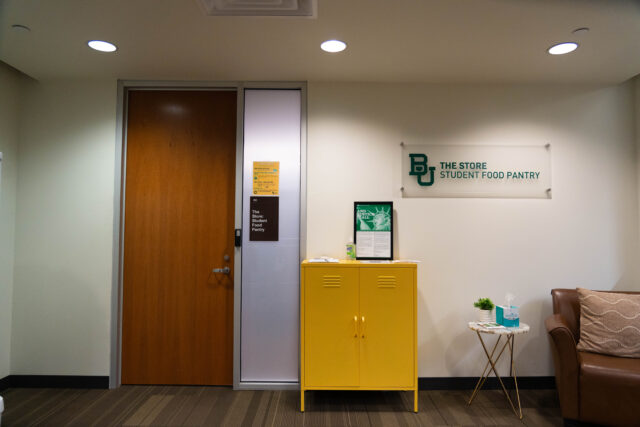By Ariel Wright | Reporter
Baylor’s on-campus food pantry — also known as The Store — serves between 65 and 100 students a day and has recently relocated from the basement of Sid Richardson to the first floor of the building’s west wing.
According to a 2022 Enrolled Student Survey, 25% of Baylor undergraduates said that in the last 30 days, they had eaten less than they thought they should because they did not have enough money for food. In response, Baylor provided resources for students struggling with food insecurity.
“American college students are more at risk for experiencing food insecurity while they’re in college than at any other time in their lives,” Lauren Da Silva, program manager for student food security and basic needs, said. “So you’re three to four times more likely to be hungry while you’re in school, at college, than at any other time in your life.”
During the COVID-19 pandemic, emergency allotments were provided to those receiving SNAP benefits. The February 2023 issuance that eliminated emergency allotments also reinstated the 20-hour work requirement for SNAP benefit recipients. This left many students who were grappling with food insecurity in a precarious position.
“Moving away from the emergency declaration or the state of emergency for COVID-19, I think, is obviously detrimental to college students because now you need to work at least 20 hours a week to qualify for SNAP,” Da Silva said.
However, some students may still be eligible for SNAP benefits via regular student exemption status.
“For a student to realistically hold down at least a 20-hour-a-week job, I think is asking a lot of those students while you’re also asking them to succeed academically, while you’re also asking them to be involved socially in the community and life of their campus,” Da Silva said.
As the effects of this are felt across the country, Baylor is offering a number of resources for students struggling with food insecurity. The rollout of a SNAP application assistance program in partnership with Texas Health and Human Services is expected in fall 2023. Meanwhile, students have access to The Fridge program, a free farmers market and the Daily Bread dining option at East Village, which has $2 hot or refrigerated meals.
“The battle to keep food on the shelves is real and to keep up with the demand is real, but we’re only just scratching the surface of what the true need on campus is,” Da Silva said.
The Store is a resource available to all students. All they need to do to enroll is fill out a virtual intake form, and they are granted immediate swipe access to the food pantry.
“What’s been challenging is just seeing how many students go in there,” San Diego sophomore Megan Luck, a student worker at The Store, said. “Usually all of them say thank you with such sincerity and genuineness because they’re just so financially reliant on this food pantry.”
The Store receives donations from the Central Texas Food Bank, so inventory changes consistently. Donations from student organization food drives, as well as monetary donations, also contribute to its stock.
“I wish, honestly, we could expand it, because we kind of run out of food really quickly because there’s a lot of students that rely on it,” Luck said.
The Store is frequently restocked with fresh produce, bread, nonperishables and feminine care products.
“I’m very thankful we have this resource because, without it, I think a lot of students would really struggle,” Da Silva said. “My hope for Baylor is that the food pantry eventually becomes the absolute last resort for our students, not the first and only one.”



